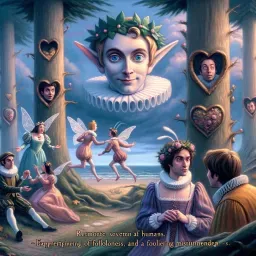To weep is to make less the depth of grief

0
0
0
0
- Meaning
- This phrase suggests that crying serves as an emotional release, helping to ease the weight of sorrow. Tears are portrayed as a natural mechanism for processing and lessening profound grief. The concept presents a psychological insight: that expressing emotions through tears is therapeutic and can facilitate healing by allowing bottled-up anguish to flow out physically.
- Allegory
- The solitary figure embodies the personal nature of grief, while their tears create ripples in the lake, symbolizing the cathartic release and the outward effect of emotional relief. The wilting trees serve as a metaphor for the burden of grief. The breakthrough of sunlight through the clouds signifies the potential for hope and healing that follows the expression of sorrow. This image poignantly illustrates the process of moving through grief toward eventual peace.
- Applicability
- The teaching of this phrase can be applied to personal life, encouraging individuals to not shy away from expressing their grief through tears. It promotes the idea that it’s healthy to grieve and that crying can significantly help in dealing with emotional pain, leading to eventual emotional recovery. Embracing this approach can lead to a more balanced and emotionally resilient life.
- Impact
- This perspective on grief has had a profound influence on cultural and social practices related to mourning and bereavement. It has inspired literature, art, and even psychological therapies that emphasize the necessity of emotional expression for healing. It remains a timeless sentiment that validates human emotions and the importance of expressing sorrow.
- Historical Context
- This sentiment has been echoed through various historical periods, notably in ancient Roman times. Various cultures have acknowledged the importance of mourning and the therapeutic role of crying in coping with loss and sorrow.
- Criticisms
- This phrase has not faced significant criticisms or controversies, as it aligns with both ancient and modern understandings of grief and emotional well-being. However, some individuals might contest the notion, believing that there's strength in stoicism and that not everyone finds relief through crying.
- Variations
- While the core idea remains consistent, different cultures might express variations of this phrase, reflecting their unique approaches to grief and emotional expression. For example, in some Eastern cultures, crying might be seen as less socially acceptable, yet the idea of expressing sorrow might manifest through other practices such as specific grieving rituals.
-

No legacy is so rich as honesty.
-

If to do were as easy as to know what were good to do, chapels had been churches, and poor men's cottages princes' palaces.
-

If music be the food of love, play on.
-

Good night, good night! Parting is such sweet sorrow.
-

Lord, what fools these mortals be!
-

I cannot lose the only thing that keeps me alive: hope. A word that is often with us in the morning, gets wounded throughout the day, and dies at dusk, but resurrects with the dawn.
-

They do not love that do not show their love.
-

Every tongue should confess that Jesus Christ is Lord, to the glory of God the Father.
-

Lupus in fabula.
-

Aquila non capit muscas.
No Comments